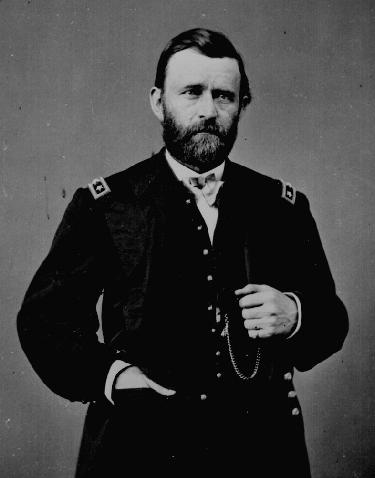 On this day in 1863, Confederate Lieutenant General John C. Pemberton surrendered his Army of Mississippi and the city of Vicksburg, Mississippi to Union Major General Ulysses S. Grant and his Army of the Tennessee. Pemberton's army had been trapped in Vicksburg and under seige since May 18, 1863, had run out of food, and had given up hope of relief. The fall of Vicksburg, coupled with the fall of Port Hudson, Louisiana five days later, removed the last Confederate obstructions to unfettered Union navigation of the Mississippi River, cut Texas and Arkansas off from the rest of the Confederacy, and signaled the beginning of the end for the South.
On this day in 1863, Confederate Lieutenant General John C. Pemberton surrendered his Army of Mississippi and the city of Vicksburg, Mississippi to Union Major General Ulysses S. Grant and his Army of the Tennessee. Pemberton's army had been trapped in Vicksburg and under seige since May 18, 1863, had run out of food, and had given up hope of relief. The fall of Vicksburg, coupled with the fall of Port Hudson, Louisiana five days later, removed the last Confederate obstructions to unfettered Union navigation of the Mississippi River, cut Texas and Arkansas off from the rest of the Confederacy, and signaled the beginning of the end for the South.Because of the Yazoo River and the Mississippi Delta just upriver from Vicksburg, approaching the city from the north is difficult. Indeed, Grant spent some four months trying to get his troops downriver into position to assault Vicksburg, and his efforts came to nothing but grief. In a flash of genius, he decided to run his naval units past Vicksburg at night, march his army below Vicksburg on the west bank of the Mississippi, cross back over to the eastern bank, and assault Vicksburg from the south. He crossed back into Mississippi on April 30 and quickly marched east to take Jackson before turning back to Vicksburg, sweeping aside various Confederate forces in his way. Grant has the reputation as an unimaginative butcher, but this isn't fair. He didn't shrink from fighting, but he had a first-class military mind. Anyone who doubts that should study the Vicksburg campaign.


No comments:
Post a Comment